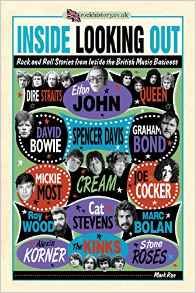
Guide to British Music of the 1960s
January 2017
Book Review
Inside Looking Out by Mark Rye

The music business is very complex. Alongside the artist there are managers, booking agents, A&R executives, producers, recording engineers, concert promoters and many more. Mark Rye has spoken with all sorts of individuals in the business to provide an overview of how the industry works but in the form of anecdotes. The book forms part of the Rock History Project which is looking to collect anecdotes and stories about the music business while it is still possible.
Many of the artists featured are relevant to Making Time. Read about Graham Bond, Status Quo, Led Zeppelin, Spencer Davis, Cream, Roy Wood, Alexis Korner, the Kinks, Cat Stevens, David Bowie and Joe Cocker. Record companies were always looking for the next big thing but in a fast-changing marketplace you signed hem to can read about groups that were turned down. Decca's Dick Rowe is not the only A&R man who failed to sign a major talent.
Denmark Street in London was also known as Tin Pan Alley and was the centre of the music industry, specifically songwriters and music publishers. Many artists would be there too. Music plugger Eric Hall remembers some of those who used to hang out there, a tea boy called Reg Dwight, Davy Jones worked across the road and Steve Marriott was working there too. Eric is not the only interviewee who refers to the legendary Don Arden as a "pussycat". Quite different from the image he has gained over the years. Neil Christian also talks about Don Arden who introduced him to Eddie Cochrane. Christian's guitarist, Jimmy Page, was also there and referred to an idea that was germinating in his head as he was about to join the Yardbirds. Now what was that big idea?
Larry Page talks about the early days with the Kinks and finding them a record deal. He also refers to some of the session musicians he used such as Jimmy Page, Clem Cattini and Vic Flick who is best known for the playing the James Bond theme. Led Zeppelin's early days are also of interest. The booking agent for Epsom Tech had been let down by the Yardbirds splitting up. However, Page's new band played in their place and went down well, even if it was one of their first gigs. Another early gig was in Southall where they were the support band on a small pub stage!
Status Quo were previously known as the Spectres. John Schroeder signed the band to Pye Records after hearing a demo of the Shirley Bassey song I Who Have Nothing. However, this and other tracks failed to make the charts and Pye had a policy of giving an artist three chances. Schroeder talks about how he believed in the band and pushed them to achieve greater things. Mike "Francis" Rossi then came up with a new song with a great hook, Pictures of Matchstick Men. The rest is history.
Nick Simper talks about how he moved from The Flowerpot Men to found Deep Purple. He notes the importance of the Graham Bond Organisation, one of the 1960s most influential bands. Teaming up with Jon Lord from the Artwoods and Ritchie Blackmore from the Outlaws we had the beginning of a great new band.
This is a fun book to read that lifts the lid on the music industry of the 1960s and 1970s. The anecdotes are fascinating and it is fascinating to read the stories behind the songs and the bands that we all know so well today.
Published 23 January 2017
Rock History